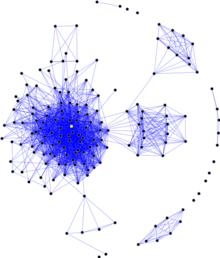Echo chamber (media)
[5] On social media, it is thought that echo chambers limit exposure to diverse perspectives, and favor and reinforce presupposed narratives and ideologies.
[10] The echo chamber effect occurs online when a harmonious group of people amalgamate and develop tunnel vision.
[3] Furthermore, the function of an echo chamber does not entail eroding a member's interest in truth; it focuses upon manipulating their credibility levels so that fundamentally different establishments and institutions will be considered proper sources of authority.
Similarly, they discovered a homophily in online friendships, meaning people are more likely to be connected on social media if they have the same political ideology.
[24] In summation, it remains that clear and distinct findings are absent which either confirm or falsify the concerns of echo chamber effects.
[2] Researchers show that echo chambers are prime vehicles to disseminate disinformation, as participants exploit contradictions against perceived opponents amidst identity-driven controversies.
[25] Echo chamber studies fail to achieve consistent and comparable results due to unclear definitions, inconsistent measurement methods, and unrepresentative data.
[26] Social media platforms continually change their algorithms, and most studies are conducted in the US, limiting their application to political systems with more parties.
In recent years, closed epistemic networks have increasingly been held responsible for the era of post-truth and fake news.
[27] However, the media frequently conflates two distinct concepts of social epistemology: echo chambers and epistemic bubbles.
By creating pre-emptive distrust between members and non-members, insiders will be insulated from the validity of counter-evidence and will continue to reinforce the chamber in the form of a closed loop.
However, one must note that this distinction is conceptual in nature, and an epistemic community can exercise multiple methods of exclusion to varying extents.
A filter bubble – a term coined by internet activist Eli Pariser – is a state of intellectual isolation that allegedly can result from personalized searches when a website algorithm selectively guesses what information a user would like to see based on information about the user, such as location, past click-behavior and search history.
[32] Both echo chambers and filter bubbles relate to the ways individuals are exposed to content devoid of clashing opinions, and colloquially might be used interchangeably.
[18] Indeed, specific combinations of homophily and recommender systems have been identified as significant drivers for determining the emergence of echo chambers.
[34] A culture war is defined as "the phenomenon in which multiple groups of people, who hold entrenched values and ideologies, attempt to contentiously steer public policy.
[37][38] In addition to this, the reduction of fear that users can enjoy through projecting their views on the internet versus face-to-face allows for further engagement in agreement with their peers.
[40] Findings by Tokita et al. (2021) suggest that individuals’ behavior within echo chambers may dampen their access to information even from desirable sources.
The echo chamber effect may prevent individuals from noticing changes in language and culture involving groups other than their own.
The lack of external viewpoints and the presence of a majority of individuals sharing a similar opinion or narrative can lead to a more extreme belief set.
Examples cited since the late 20th century include: Since the creation of the internet, scholars have been curious to see the changes in political communication.
[56] Due to the new changes in information technology and how it is managed, it is unclear how opposing perspectives can reach common ground in a democracy.


